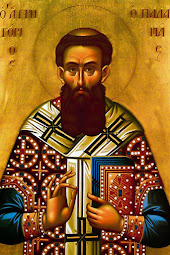St. Gregory Palamas begins by affirming that we possess the use of reason within ourselves, sin has disabled these divine images within ourselves from being seen (1.3). If you read my series on original sin, you will see this is the similar view that the Latins have, if not the exact same under slightly different worded language. There is a distinction between the divine knowledge which is sought and the worldly knowledge which is foolishness (1.8). The knowledge that St. Gregory opposes is the knowledge that is lacking in love. The knowledge that puffs up. True knowledge in God is derived from love. It builds (1.9). Knowledge from worldly education is not true spiritual knowledge (1.10). It is different and stands in opposition to the spiritual knowledge.
The knowledge that comes from the Hellenic philosophy not only is opposed to God, it also has a demonic source (1.15). Plato appeals to demons, Hesiod seeks nine demons in his entire Theogony. This is a scathing assessment of classical philosophy to a Western mind but it is important for the Christian to understand. Any truth that is to be discovered in a heresy is not because God is the source of the heresy or because the heresy leads to God but because God is the source of all true knowledge and all false knowledge is a corruption of the true knowledge. A psyche infected by demons "turns toward evil", while the "holy and disciplined spirit will flee from deceit" (1.16). The Hellenic philosophy cannot have knowledge in it. The true philosopher (lover of wisdom) will ascend toward the wisdom of God.
Much to the chagrin of the worldly education, St. Gregory deems it as empty and unnecessary to the spiritual life. "[W]orldly education serves natural knowledge. It cannot become spiritual unless it is allied to faith and love in God" (1.9). St. Gregory condemns the men who attempt to force worldly education and worldly knowledge on Christians (1.5). "It is the Hellenic heresy that concentrates all its enthusiasm and interest on those who research the science of such things" (1.3). This should be thought of most importantly when it comes to the state enforcing that all must learn a certain set of knowledges. I have often heard it said of me by many a Christian that I am "smart" and I "know my stuff" and I always bat down such sentiment because to bask in worldly knowledge is not gaining anything. Certainly, it is helpful to know one's Scriptures, to know the church fathers, and to know the doctrines and precepts of the faith. These are the only thing of value to know. But one is not saved by knowing The Philokalia, indeed it has not been translated wholly into English, or the works of St. John Chrysostom, or St. Augustine, or St. Thomas Aquinas, etc. The saints should very well be read and learned from but knowledge of their works is not unto salvation. Knowledge of the Gospel leads to transformation. Understanding is not key. Faith precedes understanding. Faith is key.
But does St. Gregory condemn the learning of worldly things? No. Actually, St. Gregory Palamas was quite a learned man himself. The "Second Theologian" said of St. Athanasius, "the benefit gained from his secular studies was that he learned to define what he judged it good to disregard" (1.6). Unless one has adopted a monastic life, no one is prohibited from learning the worldly knowledges (1.12). It is how they are used that is important. He uses the analogy of snake venom as the flesh of snakes can be turned into an antidote to use against itself when the victim is suffering from the bite (1.10). It is important and sometimes necessary to use the false knowledge against itself and to correct it. This is where discernment comes in and as a soul seeks the true wisdom of God, they begin to see how valueless the worldly wisdom is.

No comments:
Post a Comment